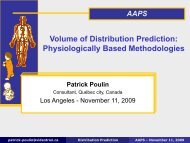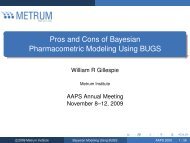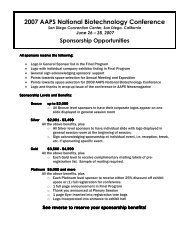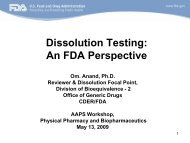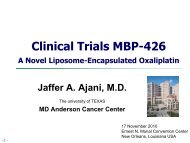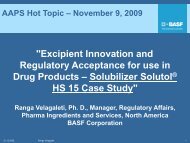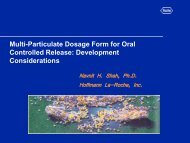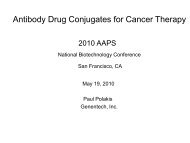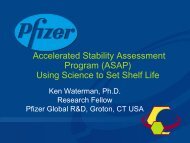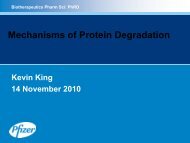Preliminary Program - American Association of Pharmaceutical ...
Preliminary Program - American Association of Pharmaceutical ...
Preliminary Program - American Association of Pharmaceutical ...
You also want an ePaper? Increase the reach of your titles
YUMPU automatically turns print PDFs into web optimized ePapers that Google loves.
43<br />
2009 AAPS Annual Meeting and Exposition<br />
Clinical Pharmacology and Translational Research (CPTR) <strong>Program</strong>ming Track<br />
TUESDAY AFTERNOON SYMPOSIA<br />
2:00 pm – 4:30 pm<br />
Leveraging Prior Quantitative Knowledge<br />
in Guiding Pediatric Drug Development<br />
Symposium<br />
The U.S. Food and Drug Administration and<br />
European Medicines Agency have recently renewed<br />
their call for innovative model-based approaches<br />
to pediatric drug development. It is evident in the<br />
requirements for sponsors to include a modeling<br />
and simulation plan, where applicable, in their<br />
pediatric investigational plans (PIP) and use <strong>of</strong><br />
clinical trial simulations to support pediatric written<br />
request. The key issues facing us today are high<br />
pediatric trial failure rate due to lack <strong>of</strong> powerful and<br />
innovative clinical trial designs, failure to establish<br />
informative pediatric dosing recommendations due<br />
to lack <strong>of</strong> appreciation for differences in exposureresponse<br />
relationship between pediatric and adult<br />
population. Traditionally, studies have focused on PK<br />
differences only. Inappropriate or lack <strong>of</strong> use <strong>of</strong> prior<br />
quantitative knowledge to better design pediatric<br />
development programs. The objectives <strong>of</strong> this<br />
session are to demonstrate through case studies the<br />
value <strong>of</strong> designing pediatric developing programs<br />
using model-based approaches, and demonstrate<br />
through case studies the impact <strong>of</strong> prior quantitative<br />
knowledge on pediatric development/dosing<br />
decisions. This symposium has been aligned with<br />
the symposium, entitled “Strategic Biomarkers for<br />
Treating Diseases in Younger Children Safely and<br />
Effectively” scheduled for Monday, November 9,<br />
2009 at 2:00 pm. The goal <strong>of</strong> this alignment is to<br />
give the attendees a complete overview <strong>of</strong> pediatric<br />
drug development.<br />
Moderator<br />
Pravin Jadhav, Ph.D.<br />
U.S. Food and Drug Administration<br />
Transforming Pediatric Drug Development by<br />
Informed Decision Making<br />
Pravin Jadhav, Ph.D., invited<br />
U.S. Food and Drug Administration<br />
Role <strong>of</strong> Modeling and Simulation in<br />
Developing PIP and Regulatory Decision<br />
Making<br />
Anja Henningsson, Ph.D.<br />
Medical Products Agency (MPA Swedish Agency)<br />
Efficient Decision Making for Clinical Trials<br />
Using a Model Based Approach<br />
Steven Kern, Ph.D.<br />
University <strong>of</strong> Utah<br />
Bayesian Model-based Approaches to<br />
Pediatric Trial Design and Dosing Rule<br />
Determination: Case Studies<br />
Marc Gastonguay, Ph.D.<br />
Metrum Research Group LLC<br />
OPEN FORUM<br />
7:00 pm – 9:30 pm<br />
Adequacy <strong>of</strong> PK/PD Model Validation<br />
and Simulation<br />
Funded by Grants from<br />
AAPS Clinical Pharmacology and Translational<br />
Research (CPTR) Section Open Forum<br />
An additional fee is required to attend this open forum<br />
As PK/PD modeling (M) and clinical trial simulation<br />
(S) are becoming routine in drug development,<br />
success ultimately depends on the robustness<br />
<strong>of</strong> the chosen model. Yet Brendel, et. al. recently<br />
concluded that only 26% to 28% <strong>of</strong> PK and PD<br />
models were adequately evaluated following a<br />
review <strong>of</strong> 324 articles published from 2002 to<br />
2004 (Clin. Pharmacokinet. 2007; 46(3):221-34).<br />
While this article’s conclusion may be subject to<br />
dispute, it does raise a legitimate question on<br />
how much model validation should be practiced<br />
in the M&S community. For example, the following<br />
questions may be considered: what are the<br />
minimum validation requirements for internal<br />
data? Among the more advanced internal validation<br />
methodologies, e.g. bootstrapping, jackknifing,<br />
Monte Carlo simulation, and etc., which approach<br />
is preferred? What is the rationale <strong>of</strong> choosing that<br />
approach? When and how should external validation<br />
be considered? What are the limitations to external<br />
validation and how might these limitations be<br />
overcome? What lessons can we learn from other<br />
industries with regard to validation, e.g. the<br />
aerospace and defense industries? Taking the PK/<br />
PD model validation question one step further,<br />
one might want to consider what type <strong>of</strong> quality<br />
requirements are needed before attempting clinical<br />
trial simulation (CTS)? What types <strong>of</strong> assumption<br />
are considered acceptable? While the successful<br />
examples <strong>of</strong> CTS have been well documented within<br />
the past few years, what lessons can we learn from<br />
them? If you would like to share your opinion with<br />
us, come join us at the 2009 CPTR Open Forum.<br />
We will survey the standards and practices to<br />
probe the questions stated above in greater depth.<br />
The results will be shared with the participants<br />
during the meeting. Similar to last year’s event,<br />
no speakers are planned as the goal is to have<br />
an open discussion among participants about<br />
their experiences and opinions on these topics.<br />
It promises to be a lively evening <strong>of</strong> food, drink,<br />
and exchange <strong>of</strong> scientific ideas. Our intent is<br />
to publish the proceedings in a refereed journal.<br />
Come join us! We look forward to having you in<br />
an enlightening open forum.<br />
Moderators<br />
Dale K. Yu, Ph.D., R.Ph.<br />
Allergan, Inc.<br />
Peter Lockwood, Ph.D.<br />
Pfizer, Inc.<br />
Wednesday, November 11, 2009<br />
WEDNESDAY SUNRISE SESSIONS<br />
7:00 am – 8:15 am<br />
Pharmacogenetics: Methods and<br />
Clinical Applications<br />
Sunrise Sessions<br />
This session will introduce the building tools<br />
and technologies that are currently used in<br />
pharmacogenomics (PGx) testing in laboratory<br />
diagnostics, drug therapy, and drug and biomarkers<br />
discovery. The clinical application <strong>of</strong> molecular<br />
diagnostics and relevant SNPs and gene expression<br />
technology used in PGx will be discussed to<br />
illustrate that patient outcome can be optimized and<br />
adverse drug reactions can be minimized through<br />
a combination <strong>of</strong> genetic testing and serum drug<br />
therapeutic level monitoring.<br />
Moderator<br />
Lawrence Fleckenstein, Pharm.D.<br />
University <strong>of</strong> Iowa<br />
Building Tools <strong>of</strong> Pharmacogenetics<br />
Majid Moridani, Pharm.D., Ph.D.<br />
Texas Tech Health Sciences Center<br />
The Application <strong>of</strong> Pharmacogenetics in<br />
Clinical Medicine and Drug Discovery<br />
Gilbert Burckart, Pharm.D., invited<br />
U.S. Food and Drug Administration






